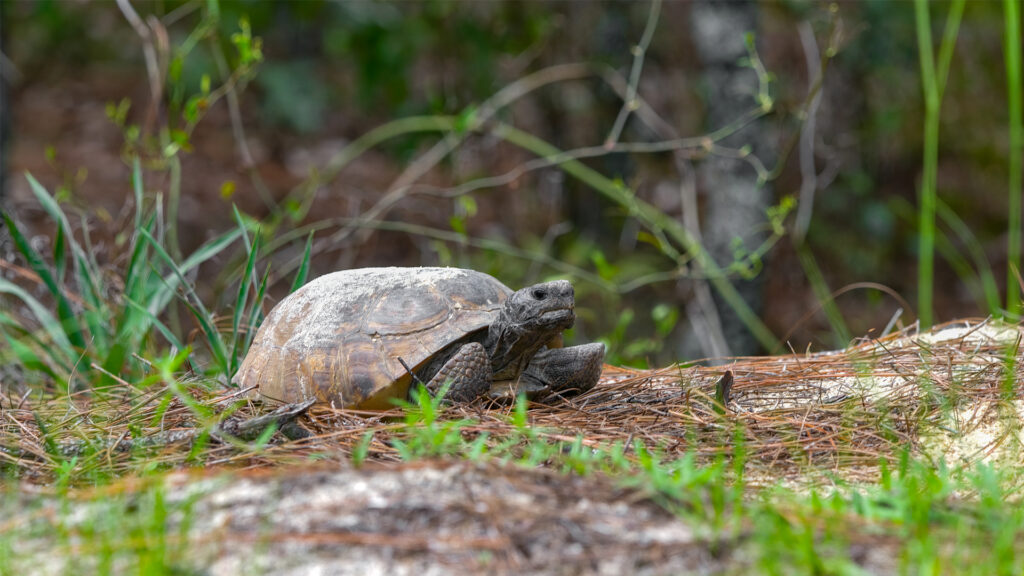By Lawton “Bud” Chiles, Jubilee Orchards
I have written before about the extinction of the American farm. Today, I’m writing about another type of extinction: the extinction of American wildlife.
Florida’s rural lands have experienced drastic changes over my lifetime. I’ve seen longleaf and wiregrass forests cut and planted in slash and loblolly pine and converted to uses that paved the way for the invasion of non-native vegetation.
The natural reoccurring fire was suppressed, allowing hardwood trees to encroach upon historically longleaf pine and wiregrass habitat. Only 3% of the historic range of the longleaf pine ecosystem remains, and it is the only home to more than 30 endangered and threatened species, such as red-cockaded woodpecker and eastern indigo snake.
But now, after implementing forest restoration practices on my property, I’m helping native Florida wildlife return.

My wife, Kitty, and I developed Jubilee Orchards, 50 acres of organic highbush blueberries just east of Tallahassee. I’m restoring much of it back to longleaf pin — one of the most diverse and endangered ecosystems in North America. In fact, in 2022 and 2023, I was named one of Florida’s 500 Outstanding Leaders for leadership in agriculture by Florida Trend Magazine.
Sustainable forestry practices, such as prescribed fire, groundcover restoration, hardwood control and wiregrass planting, support wildlife habitat while keeping my operation productive. With my own eyes, I get to marvel at the return of imperiled species, such as gopher tortoise. More than 80% of gopher tortoise habitat is privately owned, so landowners like me are key to helping this species avoid declining to the point of needing federal listing.
Voluntary conservation programs in the farm bill provide financial and technical assistance to private landowners and partners to implement such conservation practices. These programs are major tools in conserving land for wildlife, our natural and cultural heritage, and keeping small farms working.
For example, I’ve been able to implement these restoration practices thanks to the support of the farm bill’s Regional Conservation Partnership Program (RCPP). This RCPP project has brought together partners, such as Tall Timbers Land Conservancy, Defenders of Wildlife and landowners like me to get more than $7 million in funding on the ground in Florida as part of a five-year effort to assist private landowners focused on bettering their landscapes and ultimately improving downstream health. Administered by the U.S. Department of Agriculture Natural Resources Conservation Service, RCPP provides funding for voluntary public-private partnerships for locally led conservation efforts on private land.
Private land in the U.S. sits prominently on the frontlines of our planet’s interconnected habitat loss and climate change crises. Nearly 70% of the land in the lower 48 states is privately owned. Around 70% of federally endangered or threatened species occur on private lands, and 10% of those species occur only on private lands.

Global temperatures are increasing; 1 million species are threatened with extinction; soils are turning infertile; and water sources are drying up. Florida’s population grows by about 300,000 people a year, resulting in the conversion of thousands of acres of ranches alone every year.
I will not stand for my farm to add to these staggering statistics.
Florida’s private lands, and its land stewards, are vital in conserving our wildlife and climate. Landowners work with partners, such as Natural Resources Conservation Service, to conserve natural resources while keeping small farms thriving. The U.S. Department of Agriculture cannot do it without a strong farm bill that works for wildlife and future generations.
Congress is updating the farm bill this year, which is an opportunity that only comes around about every five years. I urge you to join private landowners like me in asking your members of Congress to include strong biodiversity conservation provisions in the next farm bill and ensure that the conservation programs are accessible to all American farms, especially the small farms.
Lawton “Bud” Chiles and his wife, Kitty Chiles, own and operate Jubilee Orchards, an organic blueberry farm in Tallahassee. This opinion piece was originally published by the Tallahassee Democrat, which is a media partner of The Invading Sea.
If you are interested in submitting an opinion piece to The Invading Sea, email Editor Nathan Crabbe at ncrabbe@fau.edu. Sign up for The Invading Sea newsletter by visiting here.



